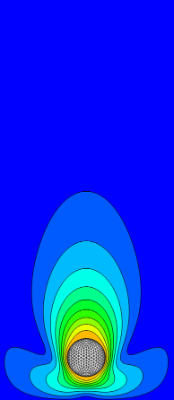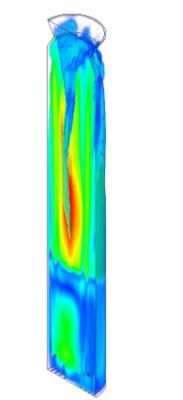CFD Research Group
At the TU Dublin CFD Research Group we aim to bring innovative solutions to engineering problems using computational simulations by developing, applying, and validating CFD models for real life applications.
We focus on linking students, research, and industry. We provide support material for students to put CFD within reach of the academic community, while developing high standard CFD software for future applications.
Our main research interests are, but not limited to, simulations involving:
- Cardiovascular fluid mechanics
- Multiphase flow
- Water and wastewater treatment plants
- Aerodynamics
- Turbomachinery
- Heat transfer
- Building energy modelling
- Particle meshless methods
- Renewable energy
Our research focuses on the application of CFD techniques to traditional, non-traditional, and multi-disciplinary applications. In our research, standard methods are often used, such as the finite volume method employed in commercial software. However, we also have a strong interest in the use and development of novel methods to analyse complex flows and fluid-structure interactions, such as the lattice Boltzmann method and smoothed particle hydrodynamics.
We envisage that the group will be a reference in the development and application of CFD methods for a wide range of problems; CFD is an interdisciplinary field, and thus the group aims to bring together researchers with expertise in different fields for the solution of engineering problems.
Our ultimate mission is to bring together multidisciplinary knowledge to develop, apply and validate more accurate and efficient computational models for the solution of applied multidisciplinary fluid dynamics problems.
To this end, the following are some of the objectives of the group:
- To bring undergraduate and postgraduate students closer to research, creating a link between teaching and research, and thus creating an interest in CFD.
- To make resources available online for students, including a CFD workflow to help students who want to get started in the CFD field.
- To promote collaborative research and knowledge transfer with education and research institutions nationally and internationally.
- To promote technology transfer with industry.
- To encourage and promote the correct application and interpretation of results to users of CFD irrespective of experience.
- To provide training and teaching.
In the CFD Research Group we believe that CFD is a valuable technology that can generate reliable predictions in an efficient and sustainable manner. We also believe that the rigorous validation of the applied CFD models will lead to trustworthy models for use in the most diverse applications, including industry and research.
To develop validated models that can be applied for the solution of real life problems and to provide solutions for a healthier and more sustainable environment using rigorous CFD simulations.
Academic and Postgraduate members of the group and their profiles are provided below.
|
Name |
Contact |
|
Dr. Anthony Reynolds Lecturer School of Mechanical Engineering |
anthony.reynolds@TUDublin.ie |
|
Ms. Audrey McCann Assistant Lecturer School of Mechanical Engineering |
audrey.mccann@TUDublin.ie |
|
Dr. Barry Duignan Lecturer School of Mechanical Engineering |
barry.duignan@TUDublin.ie
|
|
Assistant Lecturer School of Mechanical Engineering |
camila.dbastiani@TUDublin.ie |
|
Senior Lecturer School of Mechanical Engineering |
fergal.boyle@TUDublin.ie
|
|
Assistant Lecturer School of Mechanical Engineering |
gerald.gallagher@TUDublin.ie
|
|
Mr. Michael O’ Flaherty Lecturer School of Mechanical Engineering |
micheal.oflaherty@TUDublin.ie |
|
Dr. Patrick Wulliamoz Lecturer School of Mechanical Engineering |
patrick.wulliamoz@TUDublin.ie
|
|
Dr. Ronan Oliver Lecturer School of Mechanical Engineering |
ronan.oliver@TUDublin.ie |
| Title: | Development of a coupled lattice Boltzmann immersed boundary CFD solver for cardiovascular system fluid flow analysis |
|---|---|
| Summary: | The project involves the development of a CFD software package for accurately simulating blood flow, including the structural behaviour of red blood cells. A 3D C++ CUDA Lattice Boltzmann Immersed Boundary Blood Solver (CULBIBBS) has been developed for coupling with a state-of-the-art spring-network-based red blood cell model. It is anticipated that the developed model will be the most realistic developed to date and will allow for improvements to cardiovascular medical device design, facilitate greater understanding of the pathology of important blood-related diseases and improve blood vessel drug delivery techniques. |
| Opportunities: | Please contact via email or phone. |
| Contact: |
gerald.gallagher@TUDublin.ie, (01) 220 6725 fergal.boyle@TUDublin.ie |
| Title: | Multiphase CFD flow simulations applied to water and wastewater treatment |
|---|---|
| Summary: | In this project CFD is applied to the simulation of gas/liquid/solid flows in granular anaerobic wastewater treatment reactors. The end goal is to develop adequate models, that can aid in the design of those reactors, which can lead to increased biogas generation. |
| Opportunities: | Please contact via email or phone |
| Contact: |
camila.dbastiani@TUDublin.ie, (01) 220 6716 anthony.reynolds@TUDublin.ie |
Here you will find useful resources.
- FY and ME CFD Project Guide
- Verification of Laminar Pipe Flow CFD Test Cases Guide
- OpenFOAM USB Stick Starter Guide (download USB image here)
- Running the Palabos Lattice Boltzmann CFD Package on Windows Guide
- ICHEC Getting Started Guide
- ICHEC SSH Key, Accessing Kay and File Copy Guide
- SimScale Energy Cube Tutorial (download geometry here)
- CFD Research Group Logo
Publications
Our publications demonstrate intensive collaboration between researchers within the university and inter-university collaboration. The selected publications below highlight the diversity of our areas of research involving CFD, with industry-academic interaction an important driver for past, current and future research endeavours.
|
Name |
Selected Publications |
|
Dr. Anthony Reynolds |
Doherty, W., Reynolds, A. and Kennedy, D., 2015. Process simulation of biomass gasification integrated with a solid oxide fuel cell stack. Journal of Power Sources, 277, pp.292-303. Doherty, W., Reynolds, A. and Kennedy, D., 2010. Computer simulation of a biomass gasification-solid oxide fuel cell power system using Aspen Plus. Energy, 35(12), pp.4545-4555. Doherty, W., Reynolds, A. and Kennedy, D., 2010. Simulation of a Tubular Solid Oxide Fuel Cell Stack Operating on Biomass Syngas Using Aspen Plus. Journal of The Electrochemical Society, 157(7), p.B975. |
|
Dr. Barry Duignan |
Rudek, A., Muckenhaupt, D., Zitzmann, T., Russ, G. and Duignan, B., 2020. A validation study for a new erosion model to predict erosive airfoil defouling. International Journal of Computational Methods and Experimental Measurements, 8(1), pp.13-26. Rudek, A., Russ, G. and Duignan, B., 2016. Particle laden flow investigations in special purpose dry-ice blasting applications. International Journal of Computational Methods and Experimental Measurements, 4(4), pp.393-402. Briody, C., Duignan, B., Jerrams, S. and Tiernan, J., 2012. The implementation of a visco-hyperelastic numerical material model for simulating the behaviour of polymer foam materials. Computational Materials Science, 64, pp.47-51. |
|
Ms. Camila D’ Bastiani |
Bastiani, C., Alba, J., Mazzarotto, G., de Farias Neto, S., Reynolds, A., Kennedy, D. and Beal, L., 2021. Three-phase hydrodynamic simulation and experimental validation of an upflow anaerobic sludge blanket reactor. Computers & Mathematics with Applications, 83, pp.95-110. D’Bastiani, C., Alba, J., Mazzarotto, G., Farias Neto, S., Torres, A. and Beal, L., 2020. CFD simulation and PIV validation of the gas/liquid behavior in an UASB reactor. Engenharia Sanitaria e Ambiental, 25(1), pp.87-96. |
|
Prof. Fergal Boyle |
Walsh, B. and Boyle, F., 2021. In-Flow dynamics of an area-difference-energy spring-particle red blood cell model on non-uniform grids. Computer Methods in Biomechanics and Biomedical Engineering, pp.1-13. Walsh, B. and Boyle, F., 2020. A preconditioned lattice Boltzmann flux solver for steady flows on unstructured hexahedral grids. Computers & Fluids, 210, p.104634. Martin, D., Murphy, E. and Boyle, F., 2014. Computational fluid dynamics analysis of balloon-expandable coronary stents: Influence of stent and vessel deformation. Medical Engineering & Physics, 36(8), pp.1047-1056. Murphy, E. and Boyle, F., 2012. Reducing In-Stent Restenosis Through Novel Stent Flow Field Augmentation. Cardiovascular Engineering and Technology, 3(4), pp.353-373. Murphy, J. and Boyle, F., 2010. Predicting neointimal hyperplasia in stented arteries using time-dependant computational fluid dynamics: A review. Computers in Biology and Medicine, 40(4), pp.408-418. |
|
Mr. Gerald Gallagher |
Gallagher, G. and Boyle, F., 2020. CULBIBBS: A CUDA lattice Boltzmann immersed boundary blood solver for cardiovascular-system fluid flow analysis. In: Proceedings of the 26th Annual Conference of the Section of Bioengineering of the Royal Academy of Medicine in Ireland (BinI 2020). Carlow. |
|
Mr. Michael O’ Flaherty |
O’Flaherty, M., Riordan, N., O’Neill, N. and Ahern, C., 2014. A Quantitative Analysis of the Impact of Wind Energy Penetration on Electricity Prices in Ireland. Energy Procedia, 58, pp.103-110. |
Alumni
Our PhD graduates with published works involving CFD and simulation include:
- Dr Brendan Walsh - 2020
- Dr Eoin Murphy – 2017
- Dr Wayne Doherty - 2014
- Dr David Martin – 2013
- Dr Fergal O’Rourke – 2013
- Dr Jonathan Murphy – 2011
Our research has received funding from the Irish Research Council and other external bodies.
Contact us for information on possible MPhil and PhD scholarships and collaboration opportunities.
- Email: cfd.researchgroup@tudublin.ie
Below are some examples of the CFD work undertaken by our students.
Undergraduate








